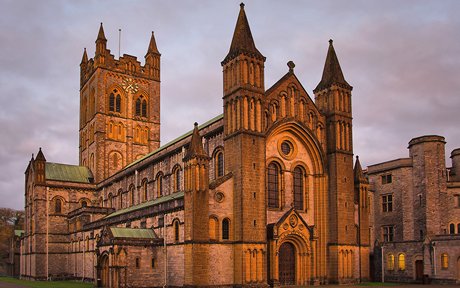The daunting journey from faith to faith

Buckfast Abbey, UK
This week, hundreds of Anglicans are leaving the Church of England to prepare to join the Catholic Church as part of the new Ordinariate. Even though they’re converting in groups, rather than on their own, it’s a big step. Members of your family, your local community, life-long friends may be disapproving and feel distressed. I should know – my grandmother said she wouldn’t speak to me if I converted, and when I did, my father said it was “all a load of nonsense”.
Becoming a Catholic in my late teens felt a bit like moving from a small village to a big city – and actually, that was close to the truth. I grew up in a village in Cheshire, where many friends went to the local Evangelical chapel. It had lovely warm carpets and friendly hymns; when I started going to a Catholic church with marble floors, high ceilings and plainchant, I really was turning my back on my family’s cultural history.
My grandmother came from an Orange family in Liverpool, where to be on the wrong side of the Protestant-Catholic divide meant that you might have stones thrown at you in the street. Even in the late Seventies, there were prejudices. “The priests will take all your money off you,” I was warned. Another friend conceded that maybe “some Catholics could be saved”.
No wonder my family was surprised – especially since it happened quite by chance. I was 16, playing a concert at the Dartington Summer School in Devon. My mother and I were in a guesthouse down the road from Buckfast, the Benedictine abbey. We went to Mass there, mainly because it was within walking distance, and immediately I had this feeling of entering an enormous, strange, fascinating new world.
It wasn’t just the unfamiliar sight of sun streaming through stained glass windows and the sound of Latin chant. I felt I was in a forbidden place, an enclave of papism – really quite an exciting sensation for an awkward, rebellious teenager. I was about to leave all Christian faith behind when this window to a bigger truth opened: that beauty can be a path to God, and that a fixed, “impersonal” liturgy can seem less man-made than extemporary prayers.
Back in Cheshire, when I started talking about becoming a Roman Catholic, it might have caused less offence if I’d taken up smoking hashish. I could have been put off – but I discovered a church in Warrington, St Mary’s, where I felt very much at home. The Benedictine priest, Fr Maurus Green, provided the warmth and gentleness that enabled me to take the plunge into the waters of the Tiber. On Sunday evenings, when I would arrive early in the cold, dark church to practise the organ, I would see Maurus huddled in his habit, praying near the front. As I approached, he would look up from the book, his face lit with a big smile, and suddenly there was no need for the electric heaters.
For a few years after converting, I’d often be reminded suddenly of where I’d ended up. Filling out the census or a doctor’s form, I’d see the box marked “Roman Catholic” and think, “That’s me! How extraordinary!”
But now it feels completely natural – and, more importantly, I no longer feel so separated from the tradition in which I grew up. If I want to attend Anglican evensong or sing Methodist hymns I can – and do, with pleasure. Our communities understand each other better. There’s room for a two-way exchange, and I hope the Ordinariate will make that exchange even warmer.
All those years ago, when I became a Catholic, it was as if I’d walked through a huge, forbidding door. But now I thank God that when people make that journey, the door no longer closes with a forbidding click; it is left swinging open, with the light shining through.
- His predecessors and St Francis of Assisi show Pope Francis the way to China
- The Holy See Responds to the Cloyne Report.
- Religious denominations and the European Union
- When are Catholic schools no longer Catholic?
- English Bishops: BBC's cuts to religion aid extremism
- In defence of the CofE’s House of Laity
- Efforts converge to strengthen a dialogue of culture and peace
- A vision for the church in India
- The Internet Must Transmit A Church Which Is Home To All
- When are Catholic schools no longer Catholic?


 Votes : 0
Votes : 0









